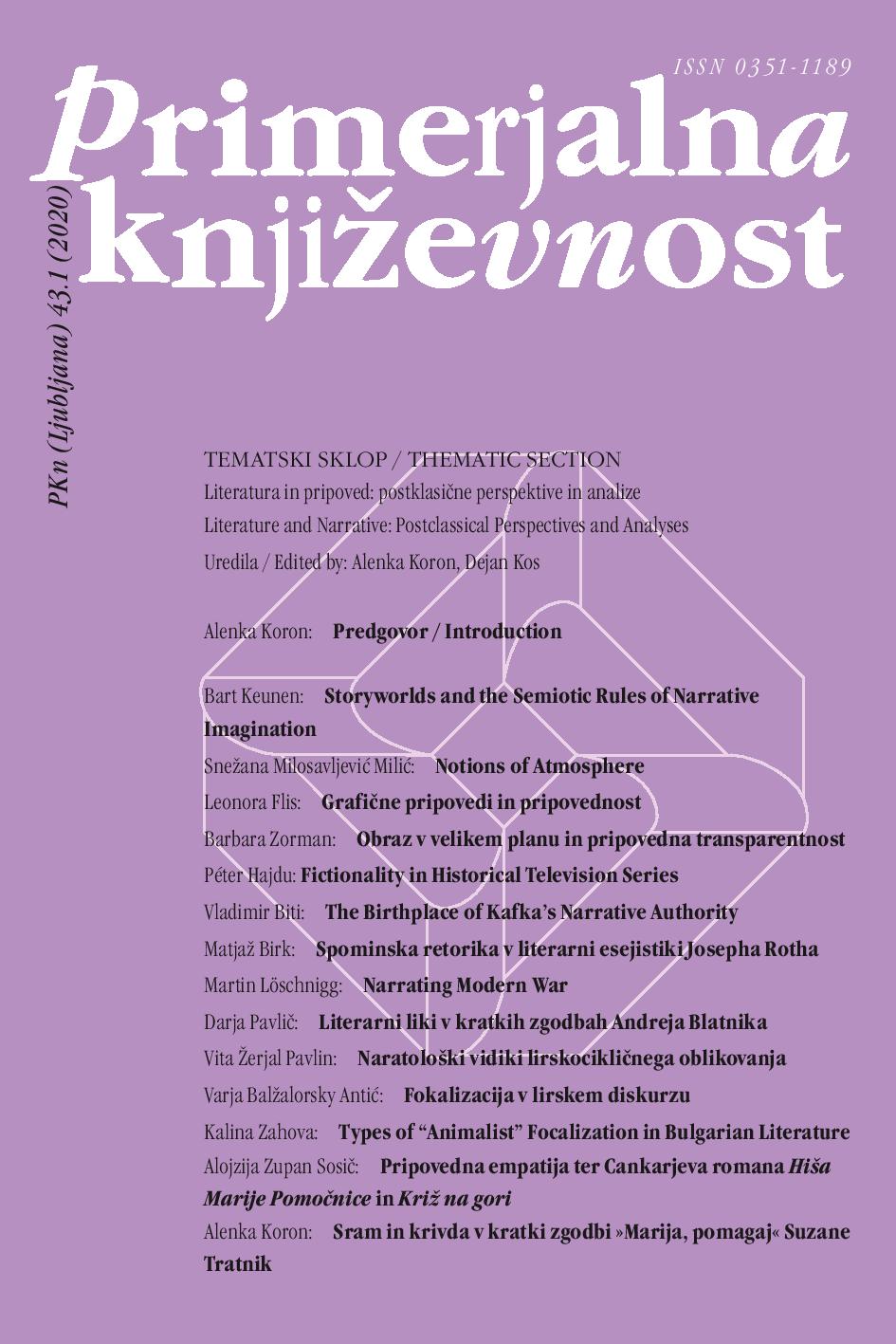Fictionality in Historical Television Series
DOI:
https://doi.org/10.3986/pkn.v43.i1.05Keywords:
historical novel, television series, fictionality, realism, documentarity, anachronism, Rome, Mad MenAbstract
The most obvious formal feature of the historical novel as the genre founded by Walter Scott is the duplicity of a fictional foreground story and a historically approved background. Many television series have a historical past setting, and many of them can be seen as similar to historical novels. The 2005–07 series Rome kept something of the Scottian structure of fictional foreground story. The Pullo and Vorenus story line is fictional, and it stages the life of ordinary people, while historical characters like Julius Caesar and Pompey or Antony and Augustus do not merely form a factual background. The fictional and non-fictional stories are in balance, and they together offer a vivid and convincing representation of the past. Many historical television shows use the past only as decorative setting for a story full of intrigue, violence and sex (The Tudors, The Borgias). These may be described as historical (anti)romances, which tend to focus exclusively on the elite. Another kind of historical novel has been developed by some shows that (as if at the other extreme) eliminate the historical facts even from the background and represent everyday life of ordinary people in its (semi-)historical otherness. In shows like Mad Men or The Knick, no event of political history is mentioned, no historical person appears in the background. However, these shows successfully represent the otherness of the past from the viewpoint of public discourse on issues of race, gender, or even morality, phenomena which can be regarded as the development of a new kind of historical novel encouraged by the twentieth-century ideals of historiography.
References
Almagor, Eran. “Earning Immortality: Cicero’s Death Scene in Rome.” Rome, Season Two: Trial and Triumph. Ed. Monica S. Cyrino. Edinburgh: Edinburgh University Press, 2015. 61–73.
Assmann, Jan. “Communicative and Cultural Memory.” The Theoretical Foundations of Hungarian “lieux de Mémoire” Studies. Ed. Pál S. Varga, Karl Katschthaler, Donald E. Morse, and Miklós Takács. Debrecen: Csokonai Kiadó, 2013. 36–43.
Bianco, Robert. “Rome Goes into Decline.” Usatoday.com 11 Jan. 2007. Web. 12 Jan. 2020.
Briggs, Ward. “Latin in the Movies and Rome.” Rome, Season One: History Makes Television. Ed. Monica S. Cyrino. Malden: Blackwell, 2008. 193–206.
Cyrino, Monica S. “Introduction.” Rome, Season One: History Makes Television. Ed. Monica S. Cyrino. Malden: Blackwell, 2008. 1–10.
Cyrino, Monica S. “Atia and the Erotics of Authority.” Rome, Season One: History Makes Television. Ed. Monica S. Cyrino. Malden: Blackwell, 2008. 130–140.
Futrell, Alison. “‘Not Some Cheap Murder’: Caesar’s Assassination.” Rome, Season One: History Makes Television. Ed. Monica S. Cyrino. Malden: Blackwell, 2008. 100–116.
Goodlad, Lauren M. E. “The Mad Men in the Attic: Seriality and Identity in the Modern Babylon.” Mad Men, Mad World: Sex, Politics, Style and the 1960s. Eds. Lauren M. E. Goodlad, Lilya Kaganovsky, and Robert A. Rushing. Durham: Duke University Press, 2013. 320–344.
Greif, Mark. “You’ll Love the Way It Makes You Feel.” London Review of Books 23 Oct. 2008. Web. 12 Jan. 2020.
Haynes, Holly. “Rome’s Opening Titles: Triumph, Spectacle, and Desire.” Rome, Season One: History Makes Television. Ed. Monica S. Cyrino. Malden: Blackwell, 2008. 49–60.
Hutcheon, Linda. The Poetics of Postmodernism. London: Routledge, 1988.
Joyrich, Lynne. “Media Madness: Multiple Identity (Dis)Orders in Mad Men.” Mad Men, Mad World: Sex, Politics, Style and the 1960s. Eds. Lauren M. E. Goodlad, Lilya Kaganovsky, and Robert A. Rushing. Durham: Duke University Press, 2013. 213–259.
Lang, Clarence. “Representing the Mad Margins of the Early 1960s: Northern Civil Rights and the Blues Idiom.” Mad Men, Mad World: Sex, Politics, Style and the 1960s. Eds. Lauren M. E. Goodlad, Lilya Kaganovsky, and Robert A. Rushing. Durham: Duke University Press, 2013. 73–91.
Lukács, Georg. The Historical Novel. Trans. Hannah and Stanley Mitchell. London: Merlin, 1989.
Milnor, Kristina. “What I Learned as an Historical Consultant for Rome.” Rome, Season One: History Makes Television. Ed. Monica S. Cyrino. Malden: Blackwell, 2008. 42–48.
Ono, Kent. “Mad Men’s Postracial Figuration of a Racial Past.” Mad Men, Mad World: Sex, Politics, Style and the 1960s. Eds. Lauren M. E. Goodlad, Lilya Kaganovsky, and Robert A. Rushing. Durham: Duke University Press, 2013. 300–319.
Polan, Lana. “Maddening Times. Mad Men in Its History.” Mad Men, Mad World: Sex, Politics, Style and the 1960s. Eds. Lauren M. E. Goodlad, Lilya Kaganovsky, and Robert A. Rushing. Durham: Duke University Press, 2013. 42–60.
Solomon, Jon. “Televising Antiquity: From You Are There to Rome.” Rome, Season One: History Makes Television. Ed. Monica S. Cyrino. Malden: Blackwell, 2008. 11–28.
Szegedy-Maszák, Mihály. “A történelmi regény létezési módja.” Műfaj és komparatisztika. Eds. Dorottya Szávai and Zoltán Z. Varga. Budapest: Gondolat, 2016. 57–67.
Toscano, Margaret M. “Gowns and Gossip: Gender and Class Struggle in Rome.” Rome, Season One: History Makes Television. Ed. Monica S. Cyrino. Malden: Blackwell, 2008. 153–167.
Weiden Boyd, Barbara. “Becoming Augustus: The Education of Octavian.” Rome, Season One: History Makes Television. Ed. Monica S. Cyrino. Malden: Blackwell, 2008. 87–99.
Wright, Andrew. “The Death of Cicero: Forming a Tradition: The Contamination of History.” Historia 50 (2001): 436–452.
Zoller Seitz, Matt. Mad Men Carousel: The Complete Critical Companion. New York: Abrams, 2015.


